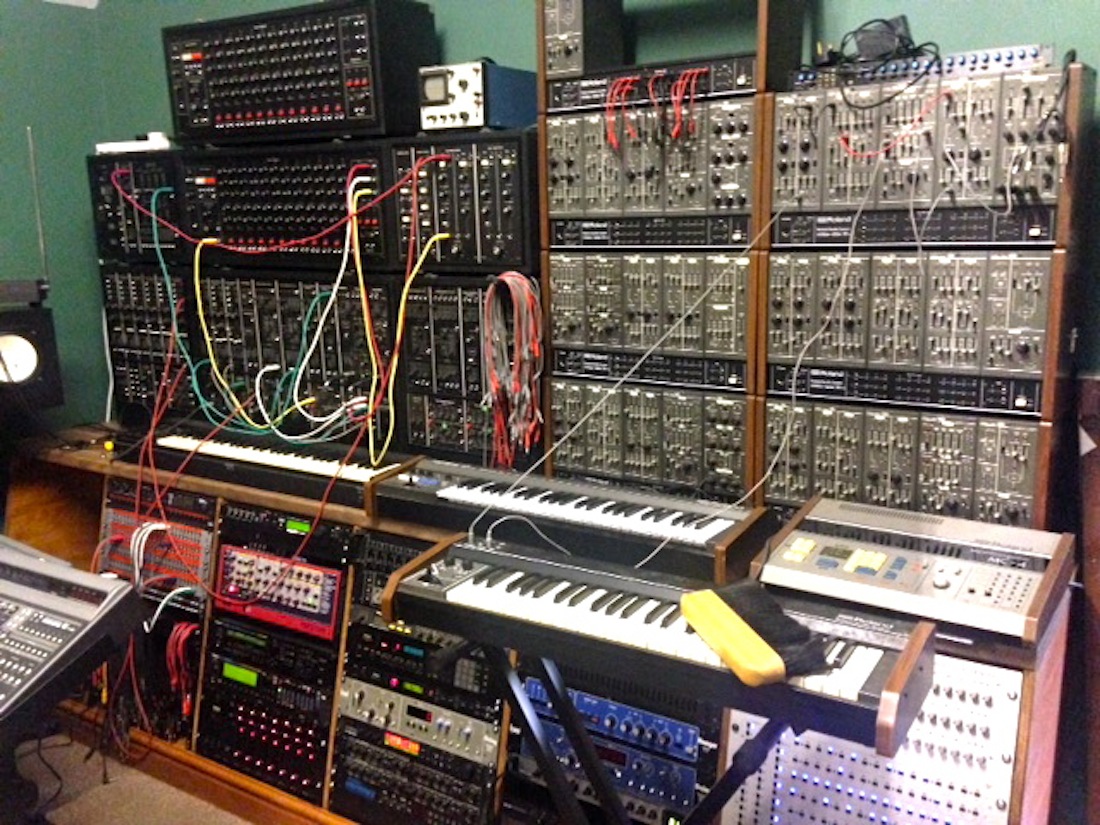Q&A: The Emperor Machine
From pop-dance to sci-fi house, the man born Andrew Meecham has done it all.

Q&A: The Emperor Machine
From pop-dance to sci-fi house, the man born Andrew Meecham has done it all.

If younger clubbers are familiar with the name Andrew Meecham, it’s likely through the British producer’s work as the Emperor Machine. It’s a project that’s seen the three-decades-and-counting veteran perfecting, via a series of EPs and albums for DC Recordings and Southern Fried Records, a oddball vision of house that has one foot in science fiction and the other in the carnival funhouse—a vision that culminated with the release of last year’s Like a Machine LP.
Meecham’s fondess for aural eccentricity wasn’t always so apparent: The noted synthesizer enthusiast, who first worked as a the keys man for electro-breakbeat unit Rhythm Mode:D, enjoyed massive success in the early ’90s as a member of pop-dance outfit Bizarre Inc (with Dean Meredith and others), releasing radio-friendly hits like “Playing With Knives” and “I’m Gonna Get You.” But it seems Meecham didn’t enjoy the view from the top of the dance charts. By the end of the decade, he was working in decidedly more left-field territory, crafting careening, punch-drunk rhythms as Sir Drew and, with Meredith and Stevie Kotey, Chicken Lips—not to mention his work with Erol Alkan as Future Four, which comes off a bit like a skewed version of Bizarre Inc. As the Emperor Machine, he’s just put a double dose of slo-mo, weirdo-house grandeur in the form of the the “Love Lick”/”Sisco Seeker” EP, released on Neil Parnell’s Nein label—and XLR8R took the opportunity to reach out to Meecham via Skype at his Llama Farm Studio, located 40 minutes north of Birmingham.

For the past few years, you’d been releasing your Emperor Machine material on Southern Fried. Why the switch to Nein?
Basically, the contract with Southern Fried was up, so I just decided to try a new label. I didn’t really want to sign with anyone for an album deal; I was just looking to release some 12-inches. I met Neil while I was DJing in Croatia, and made a promise I would record an EP for him, just a one-off EP to see how it goes. And that was it, really. It was just a matter of being free—and things kind of went from there.
The press release states that “the only brief was to stick to 107 bpm and the other around 115 bpm. I really wanted the tracks to be synth -heavy, no guitars or live bass.” You certainly followed through on all that.
Yes, that’s right! When we followed up with our chat in Croatia with a phone call, we were discussing the sound of the label, and he let me know that he really likes that mid-tempo bpm. I did the one track at around 115 and delivered it to him, and he was like, “Okay, let’s try another at 107, then.” And I was fine with that.
Do you enjoy being given such specific parameters before you get to work on a track?
Yeah, I actually do, at least when you’re talking about a slower pace. When things are slower, there’s a lot more work that I need to do, and because there is more space, it forces you to become a bit more musical. It’s quite fun. Of course, if somebody asks me to write a banging, peak-time thing, I’ll do that, too. I’m always up for any challenge.
Both “Love Lick” and “Sisco Seeker” are long tracks as well, clocking in at over ten minutes each. Was that mainly for the hypnotic effect, or was it that you wanted to squeeze so much into the tracks?
A bit of both, really. I always set a marker at ten minutes. And I always like at least a one- or two-minute intro; that’s for mixing, so you have plenty of time to bring it in.
DJs thank you for that.
Yes, it can make things easier, and at the end of the day, 12-inches should really be designed for DJs; they’re meant to be played. I know that, for me, if it’s difficult to mix—even if it’s a great track—I probably won’t play it. Anyway, next there’ll be five or six minutes of music, then maybe two minutes of beats. I basically just like long journeys, rather than a quick in and out. Some people find that a bit annoying; they’ll mix out before another section starts. Or they can just drop the needle at some middle point of the track, and just mix in at whatever section they want. But really, I just enjoy making long tracks; that’s the real reason.
The name “Love Lick” is fairly self-explanatory—but what exactly is a “Sisco Seeker”?
I have no idea. [laughs] It was just a matter of putting some words together. I think I was thinking of “disco seeker,” like someone who tracks down disco. I don’t know—I’m always just trying to find some angle when it comes to names. You want to have something that’s strange, and something you like, and something that doesn’t really mean anything but perhaps could. There’s not usually much behind them.
I’m guessing that after working on so many instrumental tracks over the years, it gets harder and harder to come up with clever new word combinations that fit your needs.
It does. Right now, I’ve got a list of about 40 words that I like, and I’ll just put one next to another one and see how it works. Sometimes they come out really good…and sometimes they’re just rubbish.
I guess it was a bit easier with Bizarre Inc, when you could lift the song title from the lyrics.
Definitely—but you needed those lyrics first, of course.
Speaking of Bizarre Inc—from the outside looking in, it seems like there was a rather major transformation of your musical inclinations between Bizarre Inc and Chicken Lips.
Well, with Bizarre Inc, we were making pop music; we were signed to a major, and what we were doing was kind of controlled by other people. After that all ended, we decided to go back to where it all began—to the clubs—and make a kind of statement to who we really were.
And that was Chicken Lips?
Yeah, Chicken Lips was the result of the anger and frustration that we were feeling.
It wasn’t exactly angry music, though.
It was more the way that we worked on it…the speed that we recorded it. It was a reaction to this very produced music we had been making.
There’s so much of what might be termed “left-field” house around nowadays—but back at the time that Chicken Lips was kicking off, a lot of house had become somewhat mainstream and even bland. Do you feel that Chicken Lips reminded other producers know that they could mess around with the template a bit?
Maybe a bit; maybe you can hear traces of what we were doing in other people’s music. And I don’t mind that at all! If anyone has taken inspiration of anything that we’ve done, that’s brilliant. Doing Chicken Lips was so exciting—it was good to go back to why we started doing this in the first place, and to get a bit of respect by doing it. We felt we had lost some of that respect with Bizarre Inc, but Chicken Lips gave us some new life, I think.

While we’re on the subject, are there any plans for you and Dean to work together again, perhaps to revive Chicken Lips?
We do chat once a week, and there are a couple of folders with some ideas in them. It’s just a matter of getting together and doing something. But, fingers crossed, it will happen. It’s brewing.
Do you consider what you do as Emperor Machine to be an extension of Chicken Lips at all, like a solo version of it? Or are they totally separate projects?
When I first started doing Emperor Machine, some of it was sounding like Chicken Lips. And I used to beat myself up about that. But then I realized, hang on a minute—I am Chicken Lips and I am Emperor Machine. I’m a player and programmer in both, so of course there will be similarities. But by now, I think that Emperor Machine has more of a sci-fi feel, whereas Chicken Lips might be more disco influenced. So there is a slight difference in my head. But sometimes when I’m working on Emperor Machine, I’ll think, oh, that would be a good Chicken Lips track. [laughs]
I was kind of shocked when I checking out the Emperor Machine page on Discogs that you’ve been working under that name for 12 years now. That in itself is longer than most dance-music producers’ careers.
Yeah, it’s mad. When I first started doing it, this kind of music—that kraut, cosmic, electronic thing—just really got me. The science-fiction feel of it, too; with the early stuff, I used to write the sound effects first, and use them to inspire the drums and everything else. All the elements that I love in music are in Emperor Machine, so I really enjoy doing it. It also seems that I like working on my own; I also like to work with other people, but working by myself is just a lot of fun. So that might explain why I’ve been doing Emperor Machine for so long.
Most people would probably say that enjoyment is the best reason for doing it.
I know—I’m really lucky.

And it probably gives you a reason to keep adding to your famed synthesizer collection.
Actually, I’ve joined studios with another guy who collects synths, so we’re really loaded with equipment. Which is good; I don’t need to buy any more at the moment. Besides, I’ve got pretty much everything I’ve ever wanted, to be honest—aside from the [Yamaha] CS-80. They’re just too expensive.
What is your go-to synth?
Recently, it’s been the Roland SH-7. That’s the one that sits right next to me.
What’s next in the world of Andy Meecham?
There’s another EP with Erol Alkan as Future Four; two of those tracks are done, and we’re working on another. There’s an EP brewing, which might be Emperor Machine or something else. As I said, Chicken Lips is brewing to some extent, and there are a bunch of other things, but I can’t really talk about them yet! So I’m keeping pretty busy—and considering the kind of music I make, that’s pretty good.
“Love Lick”/”Sisco Seeker” is out now on Nein Records.
Support Independent Media
Music, in-depth features, artist content (sample packs, project files, mix downloads), news, and art, for only $3.99/month.

